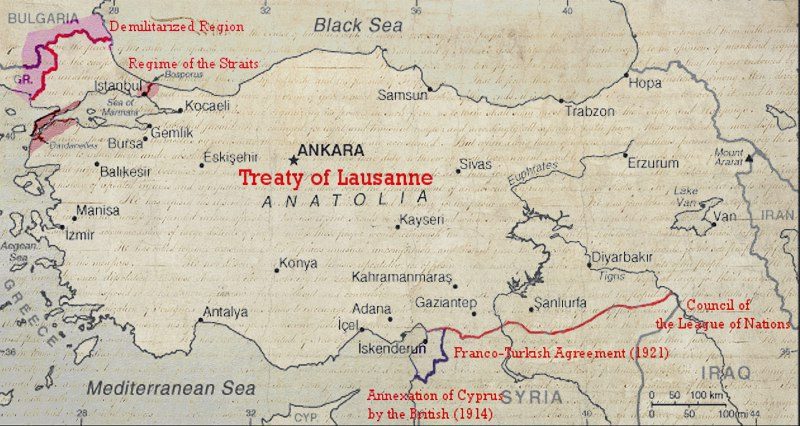Today is the 97th anniversary of the Treaty of Lausanne, one of the founding documents of the Republic of Turkey.
While Turkey celebrates the anniversary of the Treaty of Lausanne every year, Turkish revolutionaries, most notably Mustafa Kemal Atatürk, are also commemorated with a ceremony.
The Treaty of Lausanne, signed by Turkey on one side and Britain, France, Italy, Greece, and their allies on the other, recognized the modern independent Turkish state and replaced the 1920 Treaty of Sevres, an unfair pact imposed on the Ottoman Empire after World War I.
We talked about the importance of the Treaty of Lausanne for Turkey with Assoc. Prof. Dr. Sevtap Demirci.

You describe the Treaty of Lausanne as the birth certificate of the country. Could you explain it to us in more detail, please? Why did you choose such a definition?
I use the definition simply because it reflects the truth. After the dissolution of the Ottoman Empire in 1918, the National Struggle carried out by Mustafa Kemal and his followers lasted for four years (1919-22) and culminated in the international recognition of Turkey’s borders through the Treaty of Lausanne on July 24, 1923.
As it stands it is a birth certificate of the country! It is a property deed! It is a founding treaty of the Republic! It is a treaty actualizing political and economic freedom of the prospective unitary state and on top of these, it is a settlement of age-old accounts – which came to be known as the Eastern Question- between the Ottoman Empire and the Great powers of Europe.
RED LINES OF TURKEY
What were the most critical issues for Ankara in Lausanne? What were the red lines?
Turkey went to Lausanne to secure its prime objective: The National Pact (Misak-I Milli) which came to represent the Nationalist’s requirements and formed the basis of all negotiations with the Allies. The instructions from the Cabinet clearly defined the Ankara government’s goals. On two of them, the capitulations and possible establishment of an independent Armenian state in the eastern part of Anatolia, Ankara was determined to the point of risking the possibility of war. These were the red lines and Ismet Pasha – the head of Turkish delegation – had full authorization to break off the negotiations without consulting Ankara. The Nationalists on many occasions publicly proclaimed that they would only make peace on the basis of the National Pact, which stood for the complete economic, financial, and judicial independence of the prospective Republic.
‘THE TREATY GAVE INDEPENDENCE AND SOVEREIGN RIGHTS’
What does the Treaty of Lausanne mean for today?
All the peace treaties signed between the victors and the vanquished after the First World War are null and void. The only peace treaty which still exists today is the Lausanne Treaty. While the “sick man of Europe” went down into history, Turkey succeeded in rising from its own ruins and rejected the dictated peace (the Treaty of Sevres, 1920) imposed on it by the victors. The chief significance of the treaty is the re-establishment of complete and undivided Turkish sovereignty in almost all the territory included in the present-day Republic. The treaty gave the Turkish nation its independence and sovereign rights.
‘BRITISH WERE AWARE OF THE RELATIONS BETWEEN ANKARA AND MOSCOW’
What is the most striking point about the Treaty of Lausanne in the British documents?
Britain went to Lausanne to restore British prestige in the East, to ensure the freedom of the Straits (keep the Soviets away from the region) and to win Mosul for Iraq (petroleum) which was a British mandate at the time. Documents also tell us that the British desired to drive a wedge between Ankara and Moscow. They were aware of the amicable relations between the two governments throughout the Nationalist Struggle. The British General Staff also considered that Britain had much to gain from a friendly Turkey considering the Soviet threat and the loyalty of its own Muslim subjects.
How did the view of the British to the Lausanne?
For Britain the Anglo-Turkish rapprochement was fundamental since a war with the Ankara government would be detrimental to Britain’s interests. It fought with the Turks with the utmost effort in the first phase of the conference until it obtained its objectives. It blocked the conference in such a way that no progress was made until the issues concerning itself were settled. It also used the “Allied unity” as a political weapon against the Turkish claims. In the final settlement, both sides (Ankara and London) achieved their major goals. It would not be wrong to conclude that Britain suffered a political defeat but lost hardly anything of importance.
NEW DOCUMENTS…
Is your research about the Lausanne documents still ongoing? Is it possible to find new documents?
It has been some time since I was in Britain for research. I have some archival documents with me about which I had collected during my research but had no time to deal with. I hope I will have some free time to go over these documents and publish new works on the issue.









Leave a Reply